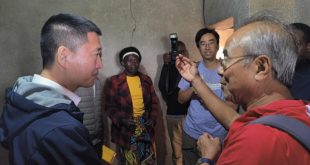The Covid-19 pandemic around the world has raised risk management / Emergency preparedness questions that need to form part of our systems going forward.
Numerous disasters have occurred and will continue to occur world-wide like Tsunamis, Hurricanes, floods and disease outbreaks like Covid -19 and Ebola. The world should by now have had a number of lessons from all these in order to be better prepared the next time round or even for other unanticipated emergencies that are yet to come.
Africa is known to be a “poorer” continent in comparison to other continents and this puts it in a weaker position when it comes to responses to a number of disasters whether man made or natural. It is therefore important for African Governments and her people to plan and know how to effectively manage various disasters/emergencies in order to minimise loss of lives and property both of which are essential for economic development.
The rate at which we respond to a problem is dependent on how prepared we are. The more prepared, the more efficient we can address any emergency that may arise. This preparedness comes from having systems and processes that have been thoroughly thought through to address conditions that are pertinent to our regions.
Country disaster risk management especially in Africa has not been that developed or at the best been adequately developed. This is evidenced by the way small emergencies like road accidents or fire breakouts are responded to.
Hunger caused by prolonged drought is another disaster that is very common on the African continent. Why are some countries always caught by surprise? This is due to lack of adequate risk management systems.
Recently there were locust invasions in some parts of Northern and East African regions. Was there a plan and budget to combat these? Was it effective? Was the damage caused by these locusts kept to the minimum? These are the questions that need to be answered by a well thought through country risk management strategy. Apparently, most countries were caught off guard and the response was through crisis management.
Back to lessons learnt from Covid-19, countries need to start preparing for the unexpected rather than running fire fighting programmes every time a disaster occurs.
Starting Country risk /disaster management programs need to start with planning for the known risks that are either man made in the various countries or natural disasters with high probability of occurrence. There is no good reason why every time a fire breaks up, the fire engines are found without tyres or malfunctioning parts that they are unable to be deployed. When this occurs it’s an evidence of poor management.
Have African countries enacted statutes that are meant to manage disasters to a granular level up to district levels? Disasters and epidemics did not start with Covid-19 and are not going to end with the end of it. What Covid-19 has done is to re-awaken world self-evaluation of the level of preparedness. Africa therefore, is in position to assess its own systems and be prepared for these disasters that can unleash immense damage to both the citizens and the infrastructure.
It is not utterly surprising in many parts of Africa to find that an accident can occur and an hour elapses without any emergency response on site. The continent has so far been saved from catastrophes of the Tsunami types thanks to the ever-forgiving nature.
Disaster risk management is important in order to reduce the impact that these disasters may cause and therefore African governments need to start evaluating their preparedness to responding quick enough and effectively to the various disasters or emergencies to mitigate the damage.
Covid-19 has given all of us wakeup calls and for African governments to benefit from this epidemic, each country needs to evaluate the following:
- What emergency preparedness plan and what types of disasters have countries prepared for?
- Are the emergency plans adequate? This refers to fit for purpose like relevance, how well equipped each response plan is in terms of resources both human and economic. Relevance in this case would refer to no need for a land locked country to prepare for Tsunami to the same level as the coastal country would.
- Developed an emergency/disaster universe that encompasses most of the known and anticipated emergencies
- Put in place a process for assessing emerging disaster trends that were not previously part of our universe
- Periodical update of risk programmes so that they can remain relevant
A case at point are the frequent landslides that keep occurring in some parts of Africa due to heavy rains. How prepared are the countries affected should they occur again to avoid a recurrence of similar damage every time a landslide occurs?
Mr. George Nsamba is a risk management practitioner
Based in Johannesburg South Africa
 Africa -China Review Africa -China Cooperation and Transformation
Africa -China Review Africa -China Cooperation and Transformation
